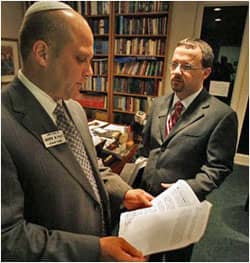 This week, from November 11 to November 13, Patheos is covering the Global Faith Forum, which "brings together distinct and conservative bodies of faith for greater understanding, while facing our differences with grace and humility."
This week, from November 11 to November 13, Patheos is covering the Global Faith Forum, which "brings together distinct and conservative bodies of faith for greater understanding, while facing our differences with grace and humility."
It promises to be an extraordinary event, with speakers ranging from Os Guinness and Ed Stetzer and Bob Roberts to Daniel Levy and Rabbi Jeremy Schneider to Eboo Patel, John Esposito, Prince Turki Al Faisal of Saudi Arabia and the Ambassador of Vietnam.
As the event website explains, the Global Faith Forum is not so much an "interfaith" conversation, which often implies a watering-down of theological distinctives, as a "multifaith" conversation in which each tradition retains its own integrity and yet builds mutually respectful relationships. We asked one of the speakers, Rabbi Jeremy Schneider of Temple Shalom in Dallas, for his thoughts in advance of the event.
Why do you believe the Global Faith Forum is important?
Since I've been working with Pastor Bob Roberts and Imam Zia, we've been working together on educating our congregations and communities. "Interfaith" dialogue has a connotation of concentrating on what we have in common and watering down your differences. Multifaith dialogue is an attempt to lift up our differences, to own them, to acknowledge that we are different and do believe differently. But we still live in the same world, the same neighborhoods, so we have similar concerns. Even with our different worldviews, we have to live together, work together, and together make the world a better place.
That has resonated very well in my community. It's a breath of fresh air to say: let's not hide our differences, let's acknowledge them, but let's work together to shape the twenty-first century.
We are one planet. We may believe differently, but that's no reason not to be talking together and working together, as we have done a number of social action projects together, side by side, Jews, Muslims and Christians.
What do you hope will occur at the forum?
My understanding of what Bob and his church are doing is really taking this message and trying as hard as they can to get more people to hear it. I applaud them for it. I'm honored to be a part of it, honored to participate and help more people add their voices to the discussion. I hope it will lead to a grass-roots movement saying, "Why have I always been afraid to speak with someone different from me? I have a unique opportunity, in talking with people who differ from me..."
I love the tagline for the Global Faith Forum: moving from a conversation about other faiths to a conversation with other faiths. That's the key.
One of the things I've heard in my community is an unfair litmus test that certain qualifications have to be met in order for us to sit down and talk. What this forum is about is saying that there is no litmus test for who you sit down with. It's about being willing to sit down with people who are different from you and have that conversation.
If you want to talk with me as a human being, and I want to talk with you as a human being, even though we don't agree with one another, that's the beginning of making the world a better place.
Learn more about the Global Faith Forum.
11/11/2010 5:00:00 AM





